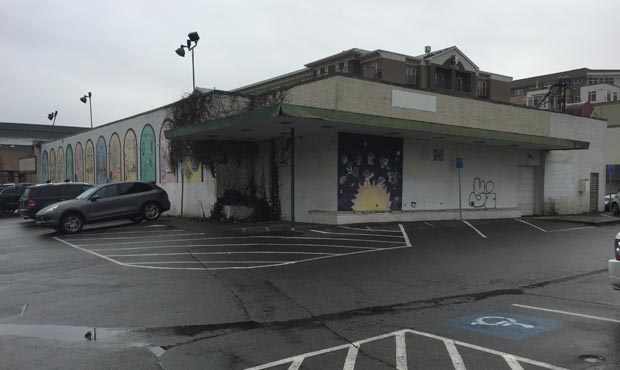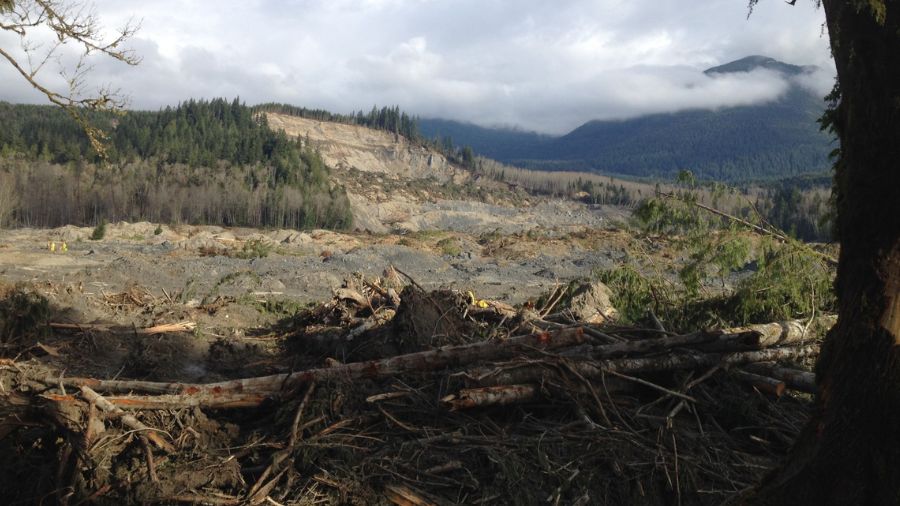The hidden heavy metal history of Kirkland
Jan 19, 2016, 5:44 PM | Updated: Mar 27, 2023, 8:42 am

The old Tradewell, now slated for demolition, as seen in January 2016. This entrance is where bands accessed the backstage area when the building was briefly an arcade and all-ages music venue called The End Zone in the early 1980s. (Feliks Banel)
(Feliks Banel)
It had all the makings of a modern suburban myth. A dark autumn night in the Pacific Northwest. A dilapidated old grocery store, converted to an arcade and all-ages club. A local band with a soon-to-be-famous lead singer. A heavy metal band from England making their first visit to Seattle, with a few days to kill.
Such were the ingredients stirred up one magical evening in 1981 at The End Zone, a short-lived club in downtown Kirkland in an old Tradewell supermarket from the 1950s.
The old Tradewell store was a showplace of postwar American commercial might when it debuted in October 1951, and it served customers for nearly 30 years before closing in the late 1970s.
Vacant for years, the store and its huge parking lot are across from the library and the transit center, and nowadays comprise one of the last big pieces of undeveloped property in the bustling Eastside city. While the building is about to be flattened to make way for condos and retail, the memories of one magical night are still standing tall for a local man.
Brent Christensen was born in the early 1960s and grew up on the Eastside. In 1981, it was the Golden Age of Heavy Metal east of Lake Washington, with bands such as TKO and Culprit playing to big-haired crowds at bars and at the all-ages Lake Hills Skating Rink.
Christensen was a rocker, and was chief roadie for a band from Redmond called Myth. Christensen also hung out in Kirkland at The End Zone. The End Zone was an arcade that had opened in the former Tradewell sometime in 1980 or 1981. It had old pinball machines and modern video games, including the first Donkey Kong game this reporter ever played.
The high supermarket ceilings in the old Tradewell appealed to Christensen, who thought the low headroom at Lake Hills detracted from the live concerts there. One day, the thought occurred to him that it would be a good idea to build a stage against the back wall of the cavernous building and begin offering live music there, too. Christensen convinced the management that it was the right thing to do. He even designed the stage himself, and it was ready to rock by the end of October. As it turned out, the timing couldn’t have been better.
That autumn, up-and-coming British heavy metal band Def Leppard was on their second tour of the United States. MTV was a new station back then, and the band’s videos were helping make them and their “High n’ Dry” album popular all over the country.
When the 1981 tour made it to the Northwest, Def Leppard played the Moore Theatre in Seattle on Halloween. They weren’t due to be in Portland for their next show until Nov. 4, so they remained in Seattle. Somehow the band agreed to do a “meet and greet” at The End Zone in Kirkland, to sign autographs for fans.
Brent Christensen immediately saw an opportunity for Myth.
Christensen told End Zone management, “I’ve got the band that I want to play down here, so when you’ve got Def Leppard coming in, we want to be the band that plays.”
Why was Myth the right band to play at what would be one of the first live concerts at The End Zone? Christensen says the band was a favorite among local musicians because they played tight arrangements and were “phenomenal.” Myth had also recently added a new lead singer. His name? Geoff Tate. Tate was another Eastsider who would later join a band called The Mob. Spoiler Alert: that band would change its name to Queensryche.
Not surprisingly, the same End Zone management who said “yes” to Brent Christensen’s idea to build a stage also said “yes” to having Myth play the Def Leppard event. Word started to spread that Def Leppard was coming to Kirkland. Christensen remembers waiting backstage with Tate and the other members of Myth as the clock ticked down before the show, and the old supermarket began to fill with fans.
According to Christensen, in the glamorous world of heavy metal, The End Zone came up somewhat short in the backstage décor department.
“It was just like the backstage of a grocery store, but without all the groceries in it,” Christensen said, stifling a laugh. “There was a few sawhorses, since we’d just gotten done building the stage for this whole thing.”
Then, the magical moment arrived. A tour bus came to a stop in the parking lot behind The End Zone.
“Def Leppard pulled up in the back, and the door goes up. They came in and we met all of them,” Christensen said.
Christensen’s most vivid memories are of Def Leppard guitarist Pete Willis.
“Pete Willis, who was the guitar player at the time, came in and he was irate. He was just cussing up a storm, saying that he’d been thrown on the bus in Seattle, and he didn’t even know they were coming there at all,” Christensen said.
“There were those sawhorses back there, and that’s what Pete Willis was leaning on and sitting against in his little pointed boots. And he was just pissed that he was having to be there to do this autograph signing,” he said.
Apart from Willis being angry for being taken against his will to Kirkland, it was revealed much later that the band’s extended Seattle stay in 1981 took a toll on at least one other member of the band.
“Animal Instinct” is the title of a 1987 book about Def Leppard by author David Fricke. Fricke writes that bassist Rick Savage told him that another guitarist named “Steve [Clark] went on a booze-a-thon during a few days’ stopover in Seattle,” and that Savage thought the band was about to implode.
Savage told author David Fricke: “It was the only time I ever considered the possibility that the band was finished, actually dying. We were having problems with Pete. Rick [Allen] was just getting over his attitude thing and I just couldn’t see much life in us if Steve went over the edge. We were so close — the album was in the Top 40, people we’re telling us it was good. And this one evening, I just got the feeling that it was ending. This was as close as we were ever gonna get.”
Clark apparently sobered up and apologized. Pete Willis, however, was dismissed from the band in 1983. Clark stayed with Def Leppard until he died of an overdose in 1991.
But back in Kirkland in November 1981, it was time for Myth to take stage of The End Zone. In those pre-Internet, pre-social media days, radio was the medium that beckoned Eastside metalheads to the event. Christensen says that by the time it was all over, at least a few hundred people showed up that night, maybe more. Myth played the four songs they knew, and brought down the house. Best of all, the members of Def Leppard were sufficiently impressed. Once again, it was radio that helped spread the word.
“They did a KISW interview the next day,” Christensen said. “They said that they saw this band Myth out there at place called The End Zone in Kirkland. They did a ‘really rockin’ set’ was the exact words they used.”
Within a year, a lot changed. Singer Tate left Myth and joined what would become Queensryche. The End Zone shut down to make way for what would become an antique mall. Def Leppard went on to become one of the biggest selling bands of the 1980s, and, with a few cast changes, continues to tour and record to this day. The rest, as they say, is history.
Christensen is retired from the music world now, but he spent years touring with Queensryche and with Alice n’ Chains. He’s not sentimental in the least about the old Tradewell grocery store where heavy metal history was made, and he has no plans to chain himself to a bulldozer or any other piece of heavy equipment to stop the demolition.
“I’m all in for progress. I’m all about moving on,” he said.
While he’s not sentimental about The End Zone, he does betray a certain fondness for the “Kirkland variety” of heavy metal groupie.
“They weren’t like the Lynnwood ones,” Christensen said, laughing. “The Lynnwood ones had big, big hair.”
You can hear Feliks every Wednesday and Friday morning on Seattle’s Morning News with Dave Ross and Colleen O’Brien, read more from him here, and subscribe to The Resident Historian Podcast here. If you have a story idea, please email Feliks here.













